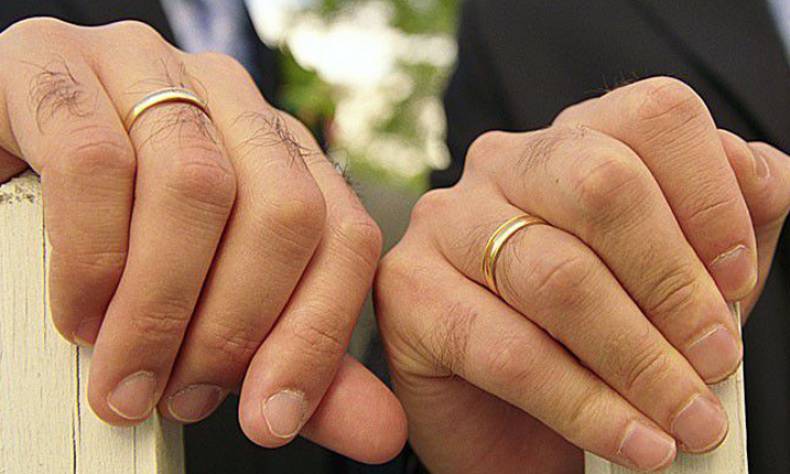
Why Did the U.S. Same-sex Marriage Decision Excite Chinese Millenials?
With the U.S. Supreme Court ruling on June 26 in favor of the right for same-sex couples to marry under the U.S. Constitution across all 50 states, a tidal wave of celebration among America’s LGBT communities and their supporters washed through social media, even flowing from America’s Golden Gate Bridge across the Pacific to the shores of China.
No sooner had the proclamation been issued by the SCOTUS than a multitude of reposts concerning the news appeared across Chinese social media networks such as WeChat (similar to WhatsApp) and Weibo (China’s version of Twitter). Many wrote congratulatory or complimentary words with their reposts, some even commending the decision as a “truly historic human victory.” However, a large proportion of those cheering the news in China – a country where same-sex relationships still suffer under considerable social stigma – do not belong to the country’s LGBT community. So what is motivating straight Chinese people to celebrate a new age in the U.S.?
China is no different from much of the developed and newly-industrialized world in that there is a growing acceptance of homosexuality among urban young people. This largely-educated demographic is also more likely to be active online, enlivened by the benign Internet atmosphere when discussing gay issues and films. An obvious difference from the social landscape of, say, 10 years ago, is the involvement of a number of heterosexual people willing to speak up for the LGBT community, most of whom have friends or relatives that are homosexual. A post-graduate student at Beijing Foreign Studies University who reposted the news on her WeChat said that she has a close lesbian friend, and that she believes the decision in the U.S. serves as a blessing to LGBT communities around the world, not just in America.
Does this growing support mean that China should also look forward to legalizing gay marriage in the near future? According to LGBT Capital, the trading arm of Galileo Capital Management Ltd (Galileo) that specializes in asset management and corporate advisory services for LGBT clients, there are over 70 million homosexual citizens in China, or around 5.3 percent of the population. This is conspicuously higher than the LGBT percentage of the U.S. population, which, according to a 2015 report by the Centers for Disease Control and Prevention, is 1.6 percent of Americans that identify as gay or lesbian and a further 1.8 percent as bisexual or “something else” (3.4 percent in total).
Most Chinese people would agree that homosexuality remains strongly discriminated against in China’s rural areas and among undereducated people. A prominent factor in the unsatisfactory recognition of the rights of the LGBT community in China is the lack of channels for LGBT people to voice their issue as a minority. It is particularly difficult to fight for rights of any kind in China if these fought-for rights do not benefit the majority, such as the rights of migrant workers. Legitimizing same-sex marriage, as the famous sexologist Li Yinhe advocates, would at least provide a channel in the legal sphere for the group to have a voice.
Despite the extensive bias towards homosexuality, a few high-profile gay couples have impressed Chinese society in recent years by having their high-profile wedding ceremonies (albeit marriages that have no legal standing) performed in front of many cameras so to publicize their cause. In 2012, a gay couple, both in their early twenties from southeastern China’s Fujian Province, held a wedding ceremony and posted their photos onto Weibo, the first gay couple to do so in the country. Although such a public display is rare, some people may believe that China is considering legitimizing same-sex marriage when they see such posts, but is it really the case?
The answer to this question has much to do with Confucianism – the ethical and philosophical system that has helped shape Chinese society and which takes its name from China’s most famous sage. The ingrained stigmatization of homosexuality in Chinese culture stems from the very essence of Confucianism, the belief that one’s premier duty is to the family, in particular with regards to the production of progeny. There is no denying that same-sex marriage violates the familial morality advocated by Confucianism.
“Confucians don’t have any discrimination against homosexual people, but for a Confucian, duties to one’s family must take precedent over the right to pursue your own happiness,” neo-Confucian scholar Fang Xudong told The Huffington Post on June 30.
Some Chinese homosexual couples resort to adopting children but such parentage has no legal standing here. Both the moral and legal concerns of gay couples raising offspring would be a major barrier towards legalizing same-sex marriage in China. Although the recent decision in the U.S. offers a blueprint for the increasingly liberal citizens of China, same-sex marriage is not likely to gain legal standing anytime soon in a culture closely clinging to familial ethics.
 Facebook
Facebook
 Twitter
Twitter
 Linkedin
Linkedin
 Google +
Google +











Comments are closed.